Campaign donations, quest for new power generation fueled new Illinois nuclear power law
- Oops!Something went wrong.Please try again later.
- Oops!Something went wrong.Please try again later.
Illinois Gov. JB Pritzker signed into law in 2023 a measure that would lift a longstanding state moratorium on building new nuclear power plants.
The bill, which was supported by all four of Peoria's elected officials, does not allow for the construction of the large, traditional power plants normally seen in the state, but rather allows for smaller-scale nuclear generating sites to be built.
Both Republicans and Democrats backed the new law, which was originally vetoed by the governor.
Energy companies lobbied for the bill and donated tens of thousands of dollars to House and Senate leadership and politicians on both sides of the aisle during the bill's lifespan in Springfield, according to campaign finance reports and witness slips signed by proponents.
Proponents of nuclear power bill give Peoria politicians thousands of dollars
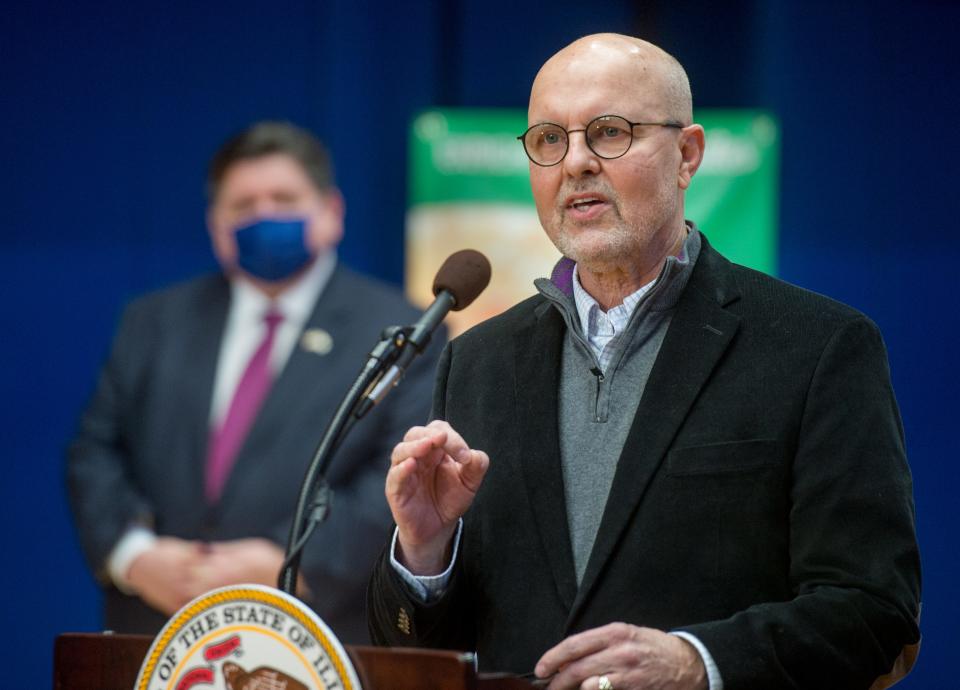
Peoria legislators Rep. Ryan Spain, R-Peoria, and Sen. Dave Koehler, D-Peoria, were the beneficiaries of campaign donations from companies with an interest in seeing the bill become law.
Vistra Corp, MidAmerican Energy and Constellation Energy all lobbied for the bill to be passed and donated money to Spain and Koehler in 2023.
Koehler received a $3,500 donation from Constellation Energy on Oct. 11. MidAmerican Energy gave Koehler $1,250 on Sept. 7. Koehler received $2,500 from Vistra Corp on Aug. 15. Koehler received another $2,500 from Constellation Energy on Jan. 3 of 2024.
Vistra Corp gave Spain $1,750 on Aug. 8. Spain received $3,000 from Constellation Energy on Nov. 8.
Vistra also gave the House Republican Organization, which is chaired by Spain, two $5,000 donations on Aug. 15.
Both Spain and Koehler said campaign donations did not sway their opinions of the bill.
"I never make decisions based on who financially supports my campaign and that's just it, period," Koehler said. "If people support me because they know what I believe and what I'm trying to do, that's fine, but I never make decisions based on any campaign contributions."
Spain said he did not receive any feedback from any energy companies that had an interest for or against the bill.
"I think it's been so long since we've engaged in nuclear power in the state of Illinois, it's not that there's imminent plan for an existing utility to job into these businesses yet, but just opening the door since it had been closed for so long in the state of Illinois," Spain said.
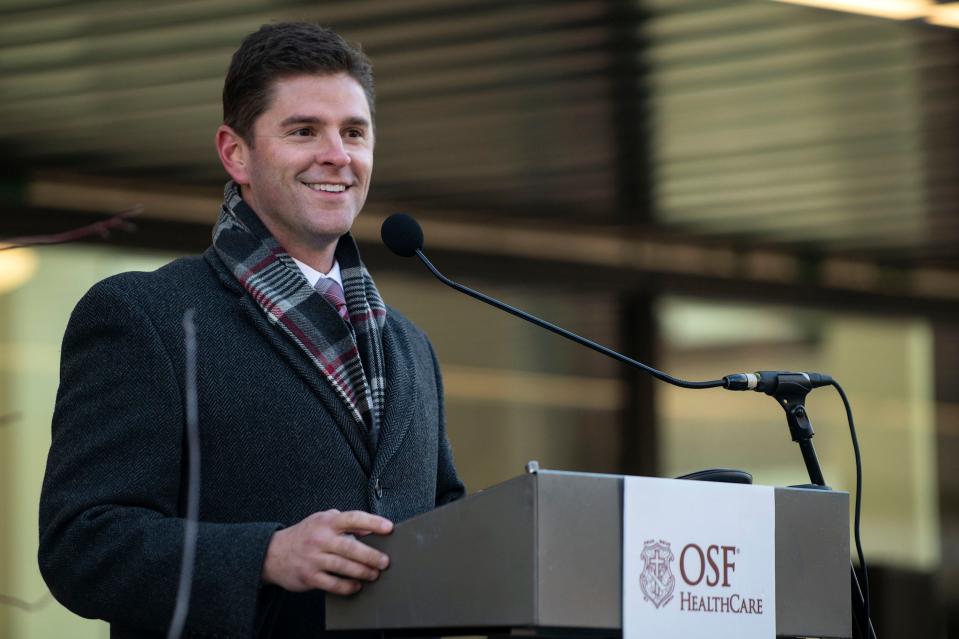
Kent Redfield, a professor emeritus and an expert on lobbying and political influence from the University of Illinois-Springfield, said these types of political donations from interest groups are common in Illinois, especially when an interest group has stake in specific legislation.
"Money is interested in our elections but it is also interested in promoting access, phone calls returned, meetings set up, an opportunity to persuade," Redfield said. "It's easy to see something like this in a Vistra. They have a substantial amount of money and they've been contributing over a long period of time."
Redfield did say too that the existence of such donations does not mean there is any kind of quid pro quo arrangement between lawmakers and interest groups. Rather, the donations can be a way for interest groups to get a seat at the table and show lawmakers they are legit.
Koehler said he supported the bill because he believes it will have a positive impact on the environment and help move the state toward decarbonization.
"With the onset of small modular reactors, I think there is a new strategy developing within the nuclear power industry and that is for smaller units that can be linked together, ramped up, ramped down, depending on what the call for electricity is on a particular day," Koehler said.
Spain said he backed the bill because the state needs to generate more of its own power and import less from other states. The new law will allow for the smaller nuclear power reactors to come online beginning in 2026.
House and Senate leadership receive large sums of money from bill's backers
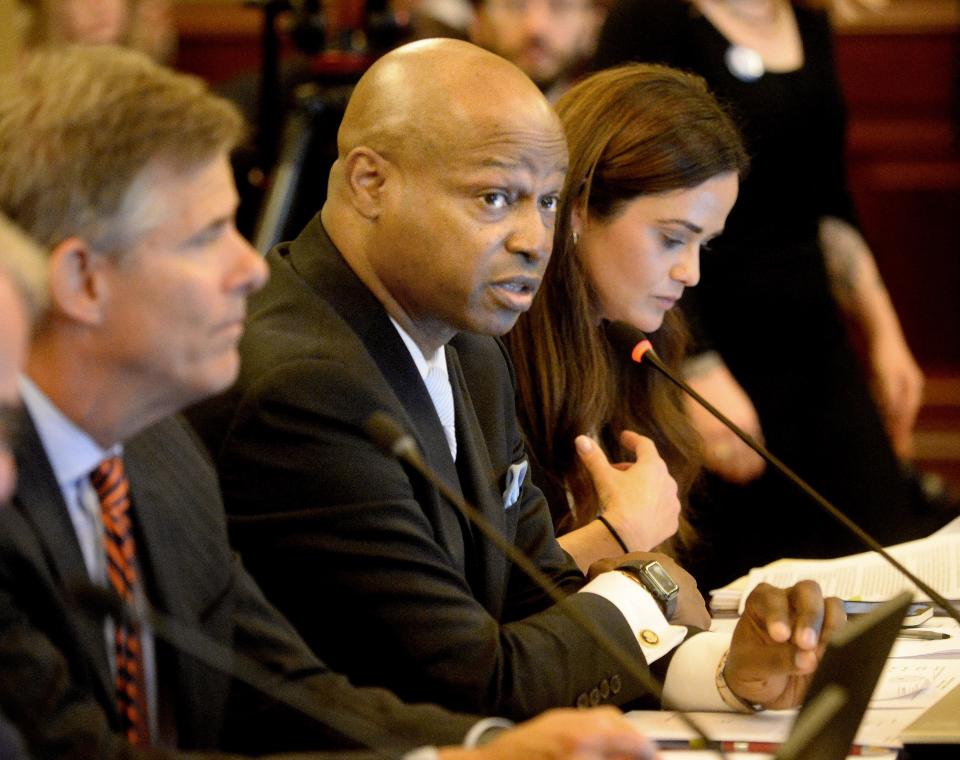
House Speaker Chris Welch, D-Cicero, and Senate President Don Harmon, D-Oak Park, also received tens of thousands of dollars from nuclear interested energy companies in 2023.
Illinois already has a significant nuclear footprint as it generates more electricity from nuclear power from its six nuclear power plants than any other state in the U.S., according to the U.S. Energy Information Service.
Campaign finance reports also show the companies made significant donations to the Democratic Party of Illinois, Democrats for the House of Illinois and the Illinois Senate Democrat Fund, a body chaired by Harmon designed to reelect Democrats in Illinois.
MidAmerican Energy gave Harmon $6,250 on Aug. 23. Harmon also received $6,250 from Vistra on Sept. 15. On Jan. 12, 2024, Harmon's ISDF received $15,000 from Constellation Energy.
Welch received $5,000 from MidAmerican Energy on Sept. 15.
Vistra, too, gave donations of $11,000 to the ISDF on Sept. 15. The Illinois Senate Democrat Fund, also known as ISDF, is a Democrat organization chaired by Harmon. The ISDF also received $5,000 from Constellation Energy on Oct. 19. On Dec. 2, 2022, the ISDF received a $17,000 donation from Constellation Energy.
Harmon has a yearslong history of receiving money from Vistra Corp and MidAmerican Energy. Since 2019, Harmon has received donations from Vistra Corp totaling $80,800. Harmon's ISDF has received $57,500 from Vistra Corp dating back to 2021.
MidAmerican Energy has given Harmon $33,800 dating back to 2005.
Democrats for the House of Illinois, a committee chaired by Speaker Welch, received a $10,000 donation from Vistra on Sept. 15. That committee also received $5,000 from Constellation Energy on Oct. 31.
“The primary proponent I talked with was Senator (Sue) Rezin, and I’m pretty sure she did not donate to any of my campaign funds," Harmon said in a statement to the Journal Star in response to questions about proponents donating to his campaign.
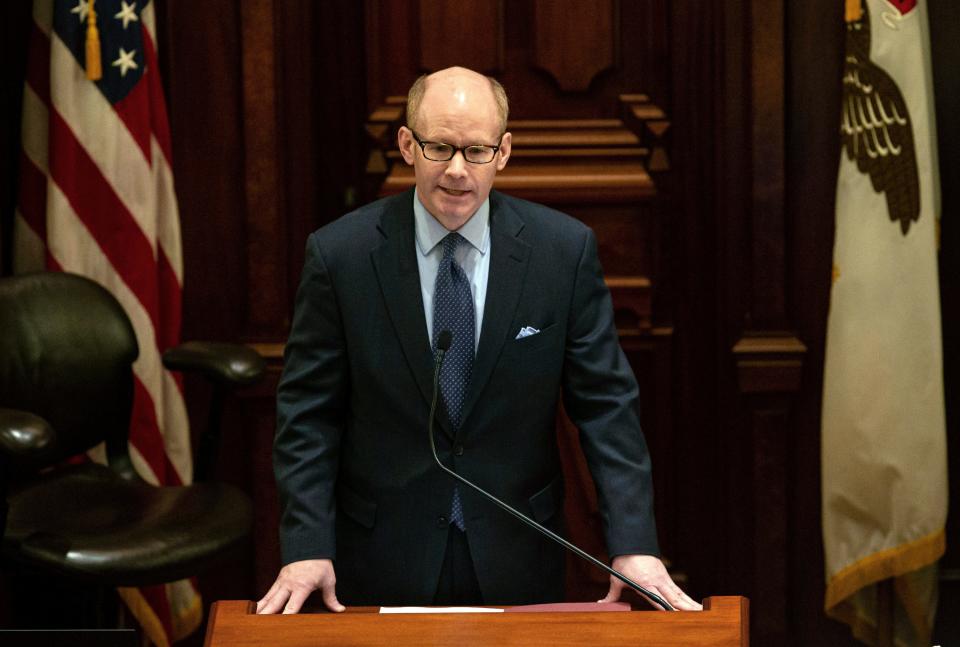
Welch, too, has a history of receiving money from Vistra Corp and MidAmerican Energy.
MidAmerican Energy has given Welch $15,000 since 2021. Vistra Corp has given Welch $46,700 since 2021 as well.
The Democratic Party of Illinois received a $5,000 donation from Constellation Energy on Oct. 12.
Redfield said donations like these to party leadership, which are almost always larger, are also very common in Illinois politics. Leaders with the most power, get the most money, Redfield said.
The donations to Harmon and Welch from special interest groups on this bill fit a strategy often used by interest groups seeking influence.
Redfield said that the timing of donations to leadership were interesting in the case of this nuclear power bill. He said the timing shows that the interest groups were "priming the pump" with donations ahead of veto hearings and negotiations for the bill.
"They're wanting to be talking about the veto and they want to be talking individually with the negotiations that went on with the new bill, so they're priming the pump," Redfield said. "It's interested money, it wants an outcome."
The Senate Republican Victory fund, which is chaired by Sen. John Curran, R-Lemont, received $10,000 from Vistra on June 28. Curran himself received two donations of $6,850 from Vistra on Sept. 13.
Sen. Sue Rezin, R-Morris, was the chief sponsor of the bill and first introduced the bill to the state legislature on Jan. 20, 2023. She also received thousands from energy companies who supported the passage of the bill.
House Democrat Lance Yednock, who introduced the bill to the House on March 31 after it passed in the Senate, did not directly receive any money from the companies. However, the Downstate Democratic Caucus, a group he serves as treasurer for, received $2,000 from Vistra on Oct. 26.
In a statement to the Journal Star, Yednock said in part:
“This agreement on small nuclear projects is the culmination of countless hours of discussion with all stakeholders including energy producers, labor unions, and environmental advocates. Their input made the final product stronger," Yednock said. "This compromise proposal paves the way for certain small-scale nuclear energy projects, and takes a significant step toward our goal of becoming completely carbon free by 2045."
What does the nuclear power bill do?
The nuclear power moratorium had been in place since 1987 when regulators put a ban on new facilities over concerns about nuclear waste storage.
Opponents to the bill, like the Sierra Club of Illinois, still have concerns about safety measures within the bill, particularly around the storage of nuclear waste.
"There is no permanent disposal site operational or even proposed at this point," said Sierra Club Illinois Director Jack Darin. "So we have this high-level material just stockpiled at our nuclear reactor sites in Illinois — some of those are on our major rivers or on the shores of Lake Michigan where it could leak into our drinking water."
Caleb Brooks, an associate professor at the University of Illinois' department of nuclear, plasma and radiological engineering, said this bill shows Illinois is willing to continue its "rich legacy" of being a leader in nuclear power in the United States.
He said it was a shame the moratorium was ever in place. As far as safety concerns go, Brooks said the nuclear industry is closely monitored and nuclear waste is taken seriously. He added that these small reactors specifically have "safety in their size."
Brooks said the waste from nuclear facilities is not produced in large volume, noting all the waste in the country could fit on a football field 10-meters deep. He said there are also methods used in other countries of recycling waste and noted that waste can also be burned in certain reactors.
"These technical challenges haven't been able to trump the political and social concerns around waste," Brooks said. "In this country, we put the fuel in a reactor for 18-months to two years, shuffle the fuel around and after three shuffles the fuel comes out and then we store it indefinitely."
As far as concerns around waste getting into drinking water go, Brooks said these are mitigated by the vessels the fuel is kept in.
"The fuel goes into a very large, very thick stainless steel vessel and its in that stainless steel vessel the fission occurs, surrounded by water," Brooks said. "That water is in a closed cooling loop so the same water keeps circulating around the loop. When it's exhausted its energy potential, the fuel is removed from that vessel and it gets placed into a large pool that has a reinforced concrete and stainless steel liner."
Koehler and Spain said they did not know of any plans to bring the new-style nuclear power plants to the Peoria area.
"I don't know about Peoria area specifically, but I do know there's some companies looking at this technology for their power plants in their own industries," Koehler said. "The reason we had to do this now is that when a company makes this kind of investment, this is a long-term decision so right now companies are making decisions on what they'll do in 2030, 2035 or 2040 and beyond, and we want to make sure they have a clear message we encourage this."
Illinois currently has six power plants located in Byron, Braidwood, Dresden, Clinton, Quad Cities and La Salle.
Timeline of the nuclear power bill
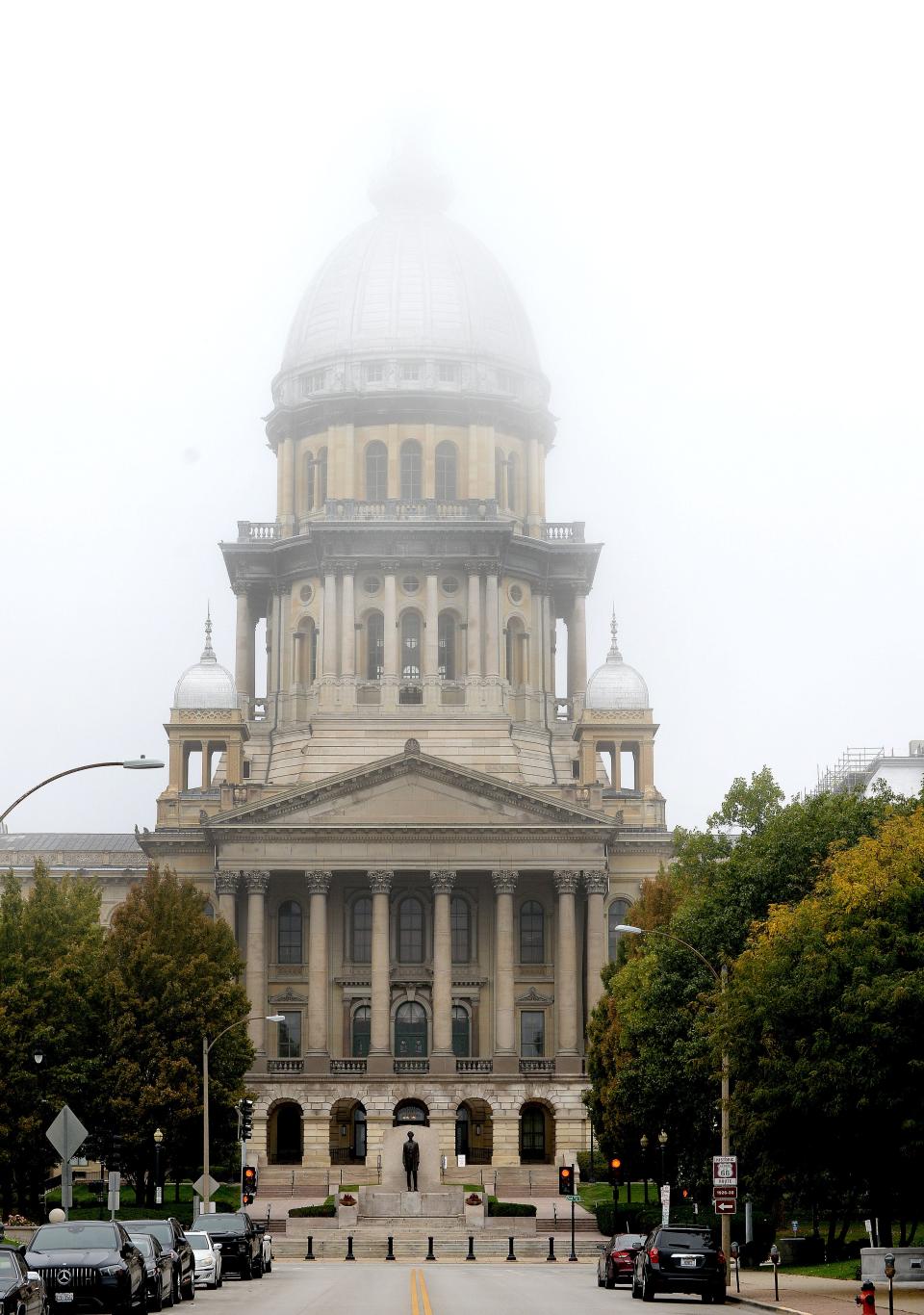
The original nuclear power bill was first filed on Jan. 20, 2023, and had its first Senate reading that same day.
On Feb. 28, it was assigned to the Senate's Energy and Public Utilities committee. Koehler is the vice-chair of that committee. Of the committee's 17 members, 12 received campaign donations from either Vistra, MidAmerican Energy or Constellation Energy.
Those receiving money were:
Rezin; Ram Villivallam, D-Chicago; Tom Bennett, R-Gibson City; Dale Fowler, R-Harrisburg; Mattie Hunter, D-Chicago, Christopher Belt, D-Swansea; Bill Cunningham, D-Chicago; Doris Turner, D-Springfield; Patrick Joyce, D-Essex; Neil Anderson, R-Andalusia; Terri Bryant, R-Murphysboro; Napoleon Harris, D-Harvey; Cristina Castro, D-Elgin.
Redfield said the fact that the interest groups targeted members of the Senate Public Utilities Committee fits a playbook often used in Springfield politics. After all, Redfield says, the best way to "kill a bill is for it to never get out of a committee."
"You've got to win every time to pass a bill but you want good terms, you want strong relationships, you want them to understand your perspective and your side of the argument," Redfield said. "All of that good will, the educations, all of those things, smart groups are going to do that."
The bill passed the Senate on March 30 and was introduced in the House the next day by Yednock.
The House Public Utilities Committee then voted to deliver the bill to the floor in a 20-1 vote. Members of the committee also received money from proponents of the bill.
Members of the House Public Utlities Committee to receive money were:
Norine Hammond, R-Macomb; Mike Coffey, R-Springfield; Jay Hoffman, R-Swansea; Travis Weaver, R-Edwards; Chris Davidsmeyer, R-Murrayville; Larry Walsh Jr., D-Elmwood; Eva Dina Delgado, D-Chicago; Jawaharial Williams, D-Chicago; Anna Moeller, D-Elgin.
Walsh Jr., who chairs the House Public Utilities Committee, received money to both his personal campaign and through the Downstate Democratic Caucus, which he chairs and Yednock serves as treasurer.
Walsh Jr. received donations from Constellation Energy, MidAmerican Energy and Vistra Corp in 2023 totaling $9,250.
The bill would go on to pass both the House and Senate on May 19 and roughly a month later it was sent to the governor.
Pritzker vetoed the bill in August, worried it would open the door to more of the older-style, large nuclear power plants.
Spain said he would have preferred the governor sign the original version of the bill to allow for the larger, traditional nuclear power plants.
Rezin and House Rep. Chris Miller, R-Oakland, then moved to override the governor's veto.
Concessions were made, and the original bill was then moved to HB 2473, which reduced the scope of the bill to only allow smaller nuclear power plants and gave the Illinois Office of Emergency Management and the Office of Homeland Security oversight of the rules for the new plants.
Pritzker signed the bill into law in December. It remains controversial. In the original bill's first hearing, 245 proponents signed witness slips and 156 signed on as opponents.
Interest groups dumped thousands of dollars into lobbying for this bill in a practice Redfield said is "normal, routine and very common" for a bill of this magnitude.
Experts like Brooks praise the bill as a way for Illinois to remain at the forefront of nuclear power generation in the United States, while others like Darin and the Sierra Club still worry nuclear power can bring negative environmental impacts with it.
In the end, the complicated and intricate process that is lawmaking has produced a law that will change power generation in Illinois for decades to come.
This article originally appeared on Journal Star: How campaign donations played a role in new Illinois nuclear power law

